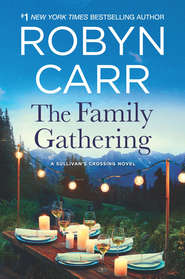По всем вопросам обращайтесь на: info@litportal.ru
(©) 2003-2024.
✖
Never Too Late
Автор
Год написания книги
2018
Настройки чтения
Размер шрифта
Высота строк
Поля
Sarah grinned. “What’s he pathetic about? Can’t he get a date?”
“He wants to take care of Clare,” Maggie said.
Sarah sipped her wine and leaned back on the sofa. “Tell him to stick it up his ass. We can take care of Clare.”
“Sarah!” Maggie said, laughing.
This, Clare thought, was why she loved her sisters so. Because they were dedicated, irreverent and sometimes hilarious. What more could a crippled, almost-forty-year-old, almost divorcée need?
When Maggie had gone and Sarah was busy in the kitchen, Clare crutched her way to Jason’s room and tapped on the door.
“Yeah?” he answered.
“Can I come in?”
“Yeah,” he said.
She found him lying on the bed with a Game Boy hovering over his face.
“I need to talk to you,” she said.
“As long as it’s not about him,” he returned, his eyes glued to the game.
Clare entered slowly, careful not to get a crutch snagged on something left on the floor—clothes, shoes, books. She could get around pretty well now and was using the crutches only to give herself assistance, to keep the pressure off her pelvis. Walking no longer caused horrid pain but the ache crept back in as the day wore on.
She slowly lowered herself to his bed and he moved his long legs over to accommodate her, but he stayed focused on his game. She gently pulled it out of his hands. He released it and sat up, leaning against the headboard. “It’s about him. I need a favor.”
“Aww.”
“Jason, the accident—it not only shook up my body, it shook up my mind. I can see that I need to make changes in my life, big changes. I have to heal my body, and also I have to heal my spirit. I have to get a life. And I need you to lighten up. I know you’re mad. I’m not going to try to talk you out of it—you can work out those issues with your counselor. But I can’t get better while I’m constantly faced with your rage. I can’t move on. Understand?”
“But don’t you hate him?”
“Actually, I don’t,” she said. She didn’t even have to reach for the answer. “I’m really mad at him. Who wouldn’t be? But Jason—he’s the one who’s losing out here. He had his last chance with me and it’s over. He lost a good wife. And, I fear, a wonderful son. You have no idea how much hurt this is causing him. You have to trust me.”
Remarkably, tears gathered in Jason’s eyes. “You should hate him,” he said, but he didn’t say it in rage, he said it with pain.
“There was a time I did,” she said, reaching out and threading some of that thick, floppy blond hair across his brow. “But I’m just too busy now. Healing is like a full-time job. And the second I’m better, I have to think about our own house, a good job and getting on with my life. My life with you.”
“Sometimes I just can’t take it,” he said.
“Take what?” He shook his head in misery, looking down. “What, Jason?”
He looked up and a tear spilled over. Even though he was at that ragged and vulnerable age, seeing him cry was rare. “He’s like his dad was, right?”
She shrugged. “I don’t know. I guess so.” She wasn’t sure of the details of Roger’s family. He never bitched about his father. His mother, a widow for some time now, complained about what her life had been like, married to a man who was greedy and unfaithful and left her virtually penniless, but Roger’s father had been dead for a long time and Roger took good care of his mother. Clare had met Roger’s father, but couldn’t say she knew him.
Just when you think your kid isn’t paying attention. Apparently Jason had heard everything that spilled out of his grandmother’s mouth.
“So? What if I’m like him?”
“Oh, Jason.”
“Well? I look like him!”
True. When he filled out, gained some muscle, survived the pimples, he would be as handsome as his father. “It could be worse, Jason. You could be like me.”
“That’d be okay!”
“Oh yeah?” she laughed. “Wishy-washy, do anything to please, passive-aggressive?”
“Passive what?” he asked, brushing impatiently at a tear.
“Passive-aggressive. I punish people by being late, by not speaking. Instead of being direct.” Not giving sex, being coolly cooperative, acting like I’m back in the marriage when I’m really just counting the days or weeks or months ’til the next confrontation.
“You’re not that way.”
She was that way with Roger, and she knew it. That’s why it was better for everyone if that cycle finally came to an end. “Or,” she said to her son, “you could be like yourself. You could be exactly the kind of man you want to be.”
“Didn’t he see his own dad being a jerk to his mother and want to be better?”
“Can’t answer that,” she shrugged. “I don’t know if he saw it, don’t know if he wanted to be different.”
“So what if you can’t help it? What if I grow up to be a crappy husband?”
“Jason, if you don’t want to be like that, you won’t. Everyone has a choice about how they act.”
“You think that?”
“I know that. Look, you can be mad, you can hate him if you want, but at the end of the day, you are who you want to be. You’re in charge of your own life. Period. You don’t have to waste one second worrying that you’ll be anything but what you want to be. I swear.”
Looking down into his lap, he nodded weakly.
She lifted his chin and looked into his eyes. “Jason, you should dump all this rage and fear of being a bad husband on your counselor. He’s getting eighty bucks an hour—he went to school forever to learn how to help people deal with stuff like this. He might be able to help you move on, you know.”
“Yeah, well, you’re wasting your money as far as I’m concerned.”
She smiled conspiratorially. “It’s your dad’s money. Knock yourself out.”
Three weeks in the hospital, six weeks at George’s, at least another two before Roger, who was not cooperating quickly by finding his own place, but Clare was beginning to think that someday—within a few weeks—she would be living a life without crutches and pain meds. Right now she was moving around with all the speed of bureaucracy. But moving around, at least.
During the two-and-a-half months since the accident, Sam Jankowski had called a few times, asking how she was feeling, interested in the progression of her recovery. She found that when she heard his voice on the phone, it pleased her. He was so friendly and solicitous, wondering if there was anything he could do, anything she needed.
Today was no different. He called and asked how it was going, and she told him about her three trips a week to physical therapy, how many pain pills she was popping a day, how long it was taking Roger to get out of the house. “But I’m afraid I’ve never been very patient,” she told him.
“Slow going, is it?”
“Oh, you have no idea.”













